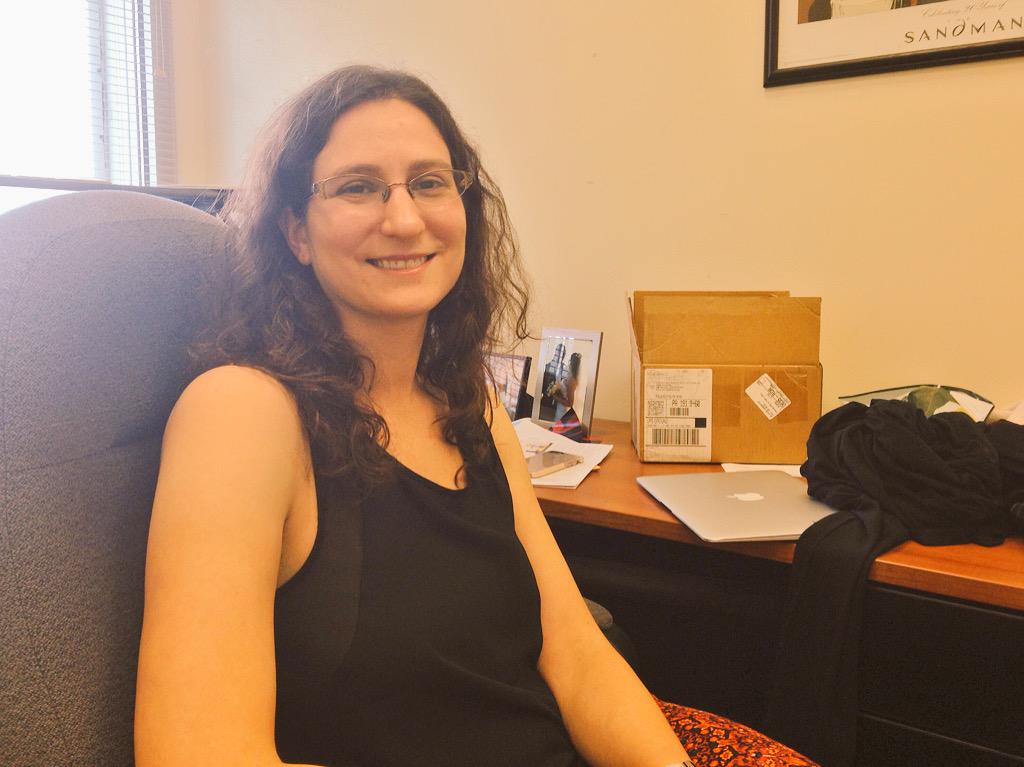To hell with origin stories.
Rachel Greenstadt could tell you how, when she was in eighth grade, she borrowed a library book with BASIC programs for encrypting and decrypting data and how she copied them into her Apple IIe to make secret messages. But that’s not the whole story. That’d just be cherry picking — editing her personal history into a narrative that makes it seems like she was going to become a privacy technology professor all along. That it was written in the stars.
And well, that’d be bullshit.
Greenstadt, 36, runs Drexel’s Privacy, Security and Automation Lab, where she works with graduate and undergraduate students to solve puzzles around privacy and technology (more on those in a second). She’s also a leader in the broader internet privacy scene, which has been growing locally — she was the reason the international Privacy Enhancing Technologies Symposium came to Philadelphia this year and she’ll be the co-editor-in-chief, choosing talks for the conference, for the next two years. But she didn’t always know she was going to work in technology.
She wanted to be an architect. (She actually went to MIT for architecture, mainly trying computer science so she could find a summer job to help pay for her college education.) She thought she might become a science fiction novelist. (She’s a big Neil Gaiman fan — her office’s walls are bare except for a Sandman poster — and she also likes Vernor Vinge and the late Iain M. Banks.)
Greenstadt dropped the prospect of being a novelist when she realized: “I don’t need to be a writer. I could be a protagonist. I could be a scientist.”
(She’s still fascinated by writing, though. Many of her projects focus on the written word, like the software programs she built with then-Ph.D. candidate Mike Brennan that aim to determine an author of a text, as well as make an author anonymous.)

Members of Drexel’s Privacy, Security and Automation Lab. (Photo by Juliana Reyes)
But back to origin stories.
Greenstadt, who grew up in Southern California and got her Ph.D. in computer science at Harvard, said that talking about origin stories isn’t just skewing a narrative, but that it can also be harmful not to show the whole picture.
Someone might read about a technologist and see that they started coding at 14 and think: “Oh, that’s not me. I don’t have that backstory. I can’t be like that.” She said she thinks that’s particularly true for underrepresented groups. (Greenstadt also advises Drexel’s Women in Computing Society.)
Greenstadt doesn’t believe that anyone has to have a particular backstory to become a technologist.
“I’m a big advocate for different routes into computer science,” she said.
She wants people to know that, despite “this bias for extreme youth,” it’s never too late to get into technology. You can pick this stuff up, she said.
At Drexel, she’s been working with students on projects like:
- How to identify (and mask) who has written a certain piece of code — students are currently working on how to determine authors of code that has been written by a group of people.
- If it’s possible to track where people are going when they use The Tor Project’s anonymous browser, based on data from Tor.
- If it’s possible to analyze cyber-criminal data to see if there are cyber-criminal gangs.
- How to analyze tweets for their “sensitivity.” Researchers built a program that could identify more personal tweets, like tweets one might later regret, and used that to analyze different Twitter accounts.
The end goal with many of these projects is to build tools that people can actually use, but it’s hard, she said, because the lab doesn’t have a UX team or a team of dedicated engineers. These are generally grad students.
“You can’t create software that’s super mature,” she said.
They do try to release as much of their code and data as possible, but it’s not the cleanest code: “It’s research code, not production code,” she said.
Greenstadt is also one-half of a privacy technology power couple: She’s married to Tor cofounder Roger Dingledine. (That’s why Dingledine is based in Philadelphia, because the couple moved to the city for Greenstadt’s job.)
She’ll be going on sabbatical this fall, spending time in Berkeley, where one of her former advisees, Sadia Afroz, is a postdoc, and Belgium.
Before you go...
Please consider supporting Technical.ly to keep our independent journalism strong. Unlike most business-focused media outlets, we don’t have a paywall. Instead, we count on your personal and organizational support.
3 ways to support our work:- Contribute to the Journalism Fund. Charitable giving ensures our information remains free and accessible for residents to discover workforce programs and entrepreneurship pathways. This includes philanthropic grants and individual tax-deductible donations from readers like you.
- Use our Preferred Partners. Our directory of vetted providers offers high-quality recommendations for services our readers need, and each referral supports our journalism.
- Use our services. If you need entrepreneurs and tech leaders to buy your services, are seeking technologists to hire or want more professionals to know about your ecosystem, Technical.ly has the biggest and most engaged audience in the mid-Atlantic. We help companies tell their stories and answer big questions to meet and serve our community.
Join our growing Slack community
Join 5,000 tech professionals and entrepreneurs in our community Slack today!

The person charged in the UnitedHealthcare CEO shooting had a ton of tech connections

From rejection to innovation: How I built a tool to beat AI hiring algorithms at their own game

Where are the country’s most vibrant tech and startup communities?



